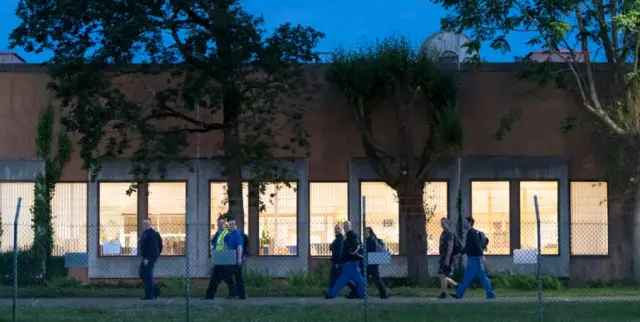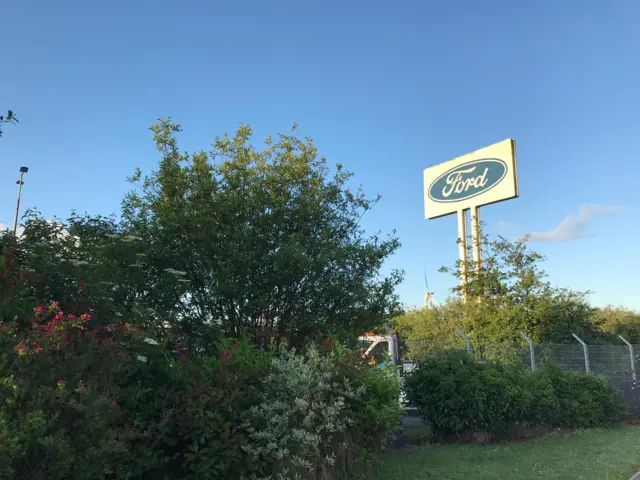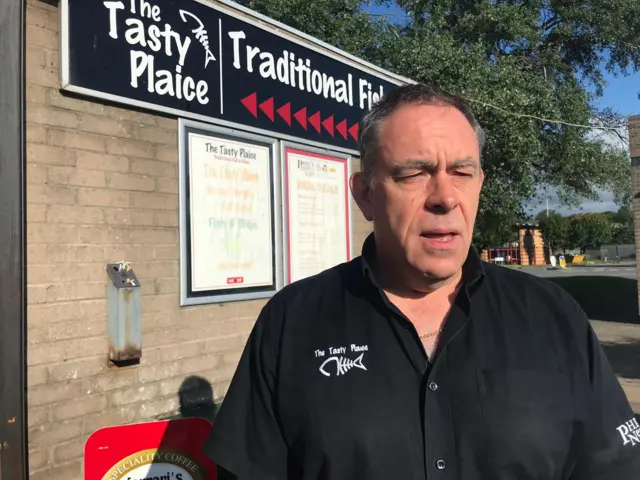Holding their breath...published at 08:32 BST 6 June 2019
Workers left after their shift on Wednesday night as it was confirmed that there was to be a meeting with Ford bosses on Thursday.
 Image source, Getty Images
Image source, Getty ImagesFord confirms it plans to close its Bridgend plant next year
Workers have been told of plans to close the factory on 25 September 2020
The firm have ceased production at the plant until Monday
Ford denied Brexit was the reason for the planned closure
The workers were told they were expected to lose their jobs in phases
The plant opened in 1980 and employs 1,700 workers
Catryn Jenkins, Chris Wood and Caleb Spencer
Workers left after their shift on Wednesday night as it was confirmed that there was to be a meeting with Ford bosses on Thursday.
 Image source, Getty Images
Image source, Getty ImagesIan Williams who has worked in the automotive industry and has friends who work at Ford said: “It’s a big impact. There’s going to be job losses. There’s the stress and the anguish and trying to meet housing payments, bills to pay and they’ve got commitments."
"They are only rumours but it is deeply concerning," said Economy Minister Ken Skates on BBC Radio Wales.
"If the company were to close the factory, we would immediately deploy a rapid response task force to help the workers find alternative work and help the wider food chain.
"We will be at the workers' side day after day ensuring they still have employment and will be fighting their corner."
Mike Payne of union GMB said: "The workers are absolutely devastated. It's going to have a major impact not just on them but their families and the wider economy in Bridgend and businesses.
"There are thousands of people working in the supply chain that rely on providing parts to Bridgend Ford."
Former Welsh MEP Derek Vaughan called it "really sad for the whole Welsh economy' on Twitter.
Economics correspondent Sarah Dickins tells BBC Radio Wales what we know so far:
Workers have been worrying for some time. The intensity of that worry about the long term future of their jobs has been rising as the months have gone on.
What we know is there is a meeting today of Ford Europe and all the union leaders from plants across Europe have been called.
I've been told that that meeting's agenda has been changed.
They were meant to be talking about electrification and then discussion of Bridgend engine plant was put on the agenda.
It's building up to a very important meeting that does not look like it is going to be good news for plant and for those individuals.
What we don't know at all is the confirmation of that and the timescale.
The plant began to find life tricky once Ford stopped assembling cars in the UK because those engines made at Bridgend go into cars in plants in Europe.
An engine made close to an assembly plant is going to be cheaper than one that has got to come all the way from Bridgend.
 Image source, Getty Images
Image source, Getty ImagesBrexit may not be the only reason for "this disastrous decision" or even the main one, said Pontypridd MP Owen Smith on Twitter.
But he asked: "Does any Brexiter want to tell me that it isn’t a factor in the loss of 1500 jobs in S. Wales?"
Ford chose Bridgend for its new engine plant in the summer of 1977 after competition from elsewhere in Europe, chiefly from Ireland.
The company had gone back to the Welsh Development Agency, which it impressed despite rejecting deals for two smaller projects. It needed an engine for its new model - code-named Erika - which was designed to rescue the company from the doldrums, especially in Europe and America.
The car became the next generation Ford Escort, and would be built at Halewood on Merseyside and at Saarlouis in Germany from 1980.
The American company looked at sites in Briton Ferry, Shotton and was close to choosing Llantrisant before opting for development land in Bridgend.
The deal was finalised after the then Labour Prime Minister James Callaghan - also a Cardiff MP - entertained the Ford Europe chairman at Chequers and then also invited Henry Ford - the grandson of the company's founder - to lunch at No 10.
The firm had concerns about strikes and Britain's industrial relations record.
But the deal was worth £36m in government money out of the £180m total cost - although there was also investment at other plants in the UK tied in. The grants for buildings and equipment also included £1m towards a new rail link to the plant.
The promise was 2,500 jobs but by the time it opened in May 1980, Ford had decided to take on only 1,400 workers.
Some of the work had already been switched to Valencia. The new Escort would have three different sized engines, not all made at Bridgend. Some would also go into the smaller Ford Fiesta. Executives had also been to Japan to see production techniques and the same number of engines could be produced there by just 800 workers.
But with industries like steel and mining in difficulty, there was still a big response in south Wales - 22,000 people applied for the new jobs and it would become one of the most important employers along the "M4 corridor".
The "Erika" and her successor would by the end of the 1980s be arguably the UK's most popular car with more than 1.6m models on the roads.
As uncertainty has surrounded the plant's future, electric cars have been suggested as the key to saving it.
In January, Welsh politicians described their determination to "lend assistance to Ford to retool them for the future" and explore this avenue.
Leighton Jenkins from CBI Wales tweets:
Allow X content?
This article contains content provided by X. We ask for your permission before anything is loaded, as they may be using cookies and other technologies. You may want to read X’s cookie policy, external and privacy policy, external before accepting. To view this content choose ‘accept and continue’.
BBC reporter Rachel Flint who is outside Bridgend Ford's plant said "A local person who didn’t want to be named, said the impact would be felt “far and wide”. She said they had told her it would be devastating. "There’s a lot of young people who work there... lots of people from the valleys work there, the lorries, it will have a large impact," they said.

"Nobody would have thought it could close before yesterday," said former first minister and Bridgend AM Carwyn Jones.
"There are challenges but also opportunities - such as battery production."
Mr Jones, who stepped down last year, told BBC Radio Wales he believed if the decision has been made to close the plant, it has been made "very recently".
He said we must wait for the announcement and then see if the site has a future.
At a cafe near the plant, owner Phil Lewis said workers had "seen it all before", with rumours in the past of closures and job losses.
However, he admitted this time it did not look good.

Allow X content?
This article contains content provided by X. We ask for your permission before anything is loaded, as they may be using cookies and other technologies. You may want to read X’s cookie policy, external and privacy policy, external before accepting. To view this content choose ‘accept and continue’.
The factory has been a landmark on the M4 corridor in south Wales for 35 years, employing 1,850 workers.
A short video history explains the competition for Ford to open in Bridgend - and how it played a part in the UK's most popular car of the 1980s.
Video graphics: Sophie Mutton
Allow X content?
This article contains content provided by X. We ask for your permission before anything is loaded, as they may be using cookies and other technologies. You may want to read X’s cookie policy, external and privacy policy, external before accepting. To view this content choose ‘accept and continue’.
If there's a way to keep this plant open, we have to keep it open and keep these jobs," said Ogmore AM Huw Irranca-Davies on Wales Live.
He said the Welsh Government has "explored every avenue", adding: "But what I would say as well, it takes two to tango on this. It takes a company to be wanting, to be willing, to be engaged on this."
“I’m still one of the new boys and I’ve done 15 years here," said worker Mark Lendrum.
"I’m absolutely devastated. It’s going to be the knock on effects.
"It’ll affect the local cafes where people would have a coffee and a cake and that won’t happen. I’ve got no idea what I’m going to do now. South Wales is going to be like a ghost town.”

The GMB has said closure would "mean disaster".
The plant has been one of the main employers in the area for the last 40 years.
Allow X content?
This article contains content provided by X. We ask for your permission before anything is loaded, as they may be using cookies and other technologies. You may want to read X’s cookie policy, external and privacy policy, external before accepting. To view this content choose ‘accept and continue’.